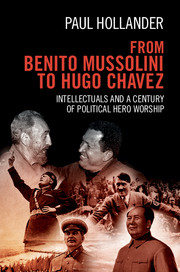Book contents
- Frontmatter
- Contents
- Preface
- 1 Introduction: Intellectuals and Politics
- 2 Mussolini, Fascism, and Intellectuals
- 3 Hitler, Nazism, and Intellectuals
- 4 Stalin, Rakosi, Soviet Communism, and Intellectuals
- 5 Western Intellectuals, Mao's China, and Cambodia under Pol Pot
- 6 Castro, Che Guevara, and Their Western Admirers
- 7 Other Dictators and Their Admirers in More Recent Times
- 8 Conclusions: The Personal and the Political
- Index
4 - Stalin, Rakosi, Soviet Communism, and Intellectuals
Published online by Cambridge University Press: 19 January 2017
- Frontmatter
- Contents
- Preface
- 1 Introduction: Intellectuals and Politics
- 2 Mussolini, Fascism, and Intellectuals
- 3 Hitler, Nazism, and Intellectuals
- 4 Stalin, Rakosi, Soviet Communism, and Intellectuals
- 5 Western Intellectuals, Mao's China, and Cambodia under Pol Pot
- 6 Castro, Che Guevara, and Their Western Admirers
- 7 Other Dictators and Their Admirers in More Recent Times
- 8 Conclusions: The Personal and the Political
- Index
Summary
This was a man … dominated by an insatiable vanity and love of power … an inordinate touchiness, an endless vindictiveness, an inability to forget an insult or a slight … [who] once observed that there was nothing sweeter in life than to bide the proper moment for revenge, to insert the knife, to turn it around and to go home for a good night's sleep … a man apparently foreign to the very experience of love, without pity or mercy … As the outlines of Stalin's personal actions begin to emerge … we are confronted with a record beside which the wildest murder mystery seems banal.
George F. Kennan[T]o him [Stalin] will fall the glory of being the greatest criminal in history … He was one of those rare terrible dogmatists capable of destroying nine tenths of the human race to “make happy” the one tenth.
Milovan DjilasTwo general propositions may explain the durable attraction of communist dictators, such as Stalin, for many Western intellectuals. The first is the profound ignorance of the personalities, policies, and intentions of these dictators. The other is a remarkable capacity for projection and wishful thinking on the part of many intellectuals (of all human beings) for attributing qualities they highly value to individuals they were disposed to admire. Even when such circumstances are taken into account, the gulf between the reality (as summarized, for example, in the assessments of Kennan and Djilas) and the deluded positive views of Stalin (to be sampled below) is so enormous that its satisfactory explanation and understanding requires both considerable effort and imagination.
It is of course easier to account for the reverence and the susceptibility to his cult on the part of the Soviet population, intellectuals included. The Soviet public could not avoid daily exposure to the systematic and thorough bombardment by the deified images of Stalin disseminated by the institutions of propaganda and education. At the same time it could also be argued that the cult might have encountered greater resistance among Soviet citizens who had intimate, daily personal experience of the many discrepancies between the promises of the authorities, Stalin included, and the disillusioning realities of their life – economic as well as political.
- Type
- Chapter
- Information
- From Benito Mussolini to Hugo ChavezIntellectuals and a Century of Political Hero Worship, pp. 118 - 161Publisher: Cambridge University PressPrint publication year: 2017



